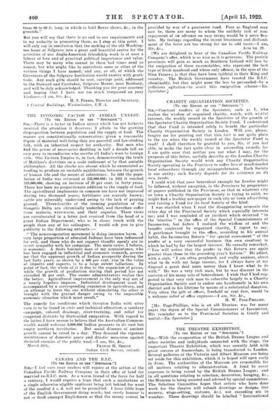THE ECONOMIC FACTOR IN INDIAN UNREST. [To THE EDITOR OF
THE " SPECTATOR."] Sce,—There is a factor in Indian unrest which has not hitherto received the attention it deserves; I allude to the growing disproportion betWeen population and the supply of food. The masses are constitutionally conservative; given a reasonable degree of material well-being they are peaceful and law-abiding folk, with an inherited respect for authority. But men who had the prices of necessaries doubling in half a decade fall an easy prey to incendiaries who ascribe all India's woes to foreign rule. Our Eastern Empire is, in fact, demonstrating the truth of Malthus's doctrines on a scale undreamt of by that amiable philosopher. All the checks are absent which he enunciated as tending to produce an unstable equilibrium between the growth of human life and the means of subsistence. In 1881 the popu- lation of India was returned at 253,000,000; in 1921 it reached 319,000,000, showing an increase of 26 per cent. in forty years. There has been no proportionate addition to the supply of food. The agricultural implements in common use have not improved during two thousand years; fertilizers are scarcely known; cattle are miserably undersized owing to the lack of grazing ground. Three-fourths of the .teeming population of the Gangetic Delta are chronically underfed, and therefore suffer from malaria, wire-worm, and their sequelae. These views are corroborated in a letter just received from the head of a great Indian Department, who is in closer touch with the people than any of his colleagues. I would ask you to give publicity to the following extracts :-
" The non-co-operation movement is doing immense harm. A very large proportion of educated Indians have been influenced for evil, and those who do not support Gandhi openly are in secret sympathy with his campaign. The main cause, I believe, is economic. A Soots business man of my acquaintance, who has been engaged in industrial and economic research, assures me that the apparent growth of Indian prosperity during the last forty years, as shown by a 400 per cent. rise in the value of imports and exports, is to a large extent fallacious. In point of fact, the whole of it is due to the expansion of prices, while the growth of production during that period has not exceeded 35 per cent. The sooner administrators realize this the better. Agricultural improvement is the only way out of a nearly hopeless impasse. Industrial development must be accompanied by a corresponding expansion in agriculture, and an attempt to force the one without stimulating the other is fraught with the gravest danger owing to the impossible economic situation which must result."
The remedy for conditions which threaten India with utter ruin is to be found in civic and technical education, a sanitary campaign, sub-soil drainage, river-training, and relief for congested districts by State-aided emigration. With regard to the latter,I have reason to believe that the Australian Common- wealth would welcome 5,000,000 Indian peasants in its vast but empty northern territories. But social diseases of ancient growth cannot be cured in a day. They demand the vigorous maintenance of domestic peace and drastic measures against declared enemies of the public weal.—I am, Sir, &c.,
andian Civil Service, retired).


































 Previous page
Previous page